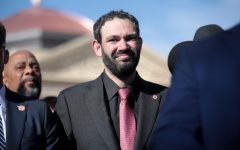
Steve Montenegro (Photo: Montenegro Campaign)
Freedom Caucus Members Chaplik, Kolodin Snubbed for Leadership
Decision sparks backlash over new house speaker priorities
By Christy Kelly, November 20, 2024 6:00 am
The election of Representative Steve Montenegro (R-29) as Speaker of the Arizona House continues to spark internal debates within the Arizona Republican Party. The release of the new Speaker’s Committee assignments has amplified the discord. Most notably, the selections exclude Montenegro’s speakership challenger, Representative Joseph Chaplik (R-3), and Freedom Caucus leader Alexander Kolodin (R-3). Despite the Arizona Globe clarifying that only the statutory committee chair positions remain unfilled as of Tuesday night, it’s unclear whether any would go to the pair. Chaplik was chair of the ethics committee last year, but so far, Montenegro has not filled that role. A political pundit who spoke on the condition of anonymity advised it could just as likely go to Kolodin or even another Representative.
🚨FOR IMMEDIATE RELEASE🚨
Speaker-Elect @SteveMontenegro Announces Speaker Pro Tempore, Committee Leadership Appointments for 57th Legislature“@NealCarterAZ is a principled conservative leader who has demonstrated exceptional leadership and a deep respect for the legislative… pic.twitter.com/okk62yYMUr
— Arizona House Republicans (@AZHouseGOP) November 18, 2024
Chaplik, also a member of the Freedom Caucus, ran for the Speaker position, securing the second-highest number of votes after Montenegro. However, the contest between Chaplik and Montenegro turned nasty, splitting the party along faction lines. Kolodin, also affiliated with the Freedom Caucus, is recognized for his legal expertise, with colleagues describing him as having “a brilliant mind.” The omission of Chaplik and Kolodin from committee leadership assignments raises questions about the caucus’ internal dynamics and Montenegro’s early decision-making.
During the previous session under Speaker Ben Toma, both the Standing and Statutory Committees assignments were distributed concurrently, eliminating the drama and infighting now occurring. Under Toma, both Kolodin and Chaplik were chairs and vice-chairs of prominent committees. The Arizona Globe previously reported on these assignments here.
A Capitol insider, also speaking on the condition of anonymity, told the Arizona Globe,” “Rep. Chaplik is actually still waiting for Rep. Montenegro to reach out. It’s unprecedented for the nominated Speaker to not reach out to the second highest vote-getter.”
Another seasoned Capitol insider (also requesting anonymity) conveyed a more stridently worded statement to the Globe: “Montenegro’s chairmanship selections represent the proverbial pork caucus on steroids. He has assembled the most big government AZ House of Representatives Arizona has seen in nearly a quarter century. It’s a chairman’s lineup for the lobbyists and by the lobbyists.”
Outgoing Representative Jacqueline Parker posted on X: “Also, in the case of the House, openly turning chairmanship appointments over to the worst of the worst lobbyists is a dereliction of duty the likes of which the AZ leg has not seen for quite a while (if ever). So far, the secret vote was just a caucus agreement. It can be changed””
Dan Farley, AZ Tea Party president, posted concerns on X, too:
I’m hearing the new AZ Speaker of the House has intentionally excluded @AZFreedomCaucus Reps from committee assignments. @SteveMontenegro don’t think AZ constituents aren’t paying attention to your moves. We are! https://t.co/OkpTitzVlm
— Dan Farley 🇺🇸 (@realDanFarley) November 19, 2024
The recent restructuring of the Arizona House committees under the new Speaker sparked significant debate among policy experts and political observers. One notable change for the 2025 Legislative session is the merger of the Elections Committee and the Federalism and Military Affairs Committee. Jen Fifield, an election specialty journalist for Votebeat, The Arizona Mirror, and other outlets, highlighted the merger, posting, “Elections committee in the House will be combined with federalism, military affairs in 2025.”
Merissa Hamilton, a prominent election integrity advocate in Arizona, strongly disapproved of the restructuring. She remarked, “You killed the Election Integrity Committee and shoved it as an afterthought into a random committee. This is the opposite of leading on Election Integrity, Steve Montenegro. This is worse than what my original concerns were! The integrity of our elections should be a top priority, not an afterthought.”
Critics of Montenegro’s committee changes and selections argue that they reflect a shift away from grassroots issues, such as election integrity, to a more lobbyist-driven agenda. As debates within the party continue, these developments highlight the challenges of balancing leadership, unity, and legislative priorities in a polarized political landscape.
Notably, no one was willing to go on the record, further emphasizing the fluid and potentially inflammatory nature of the committee negotiations.
- Nguyen, Petersen Hit Dem Caucus for Iran Stance - March 2, 2026
- Mesnard, Olson Tax Bills to Test Hobbs’ 2026 Veto - January 16, 2026
- Petersen, Montenegro Await SCOTUS ‘Save Women’s Sports’ Outcome - January 13, 2026


